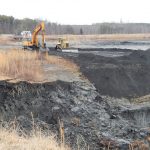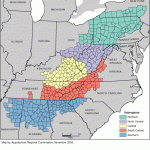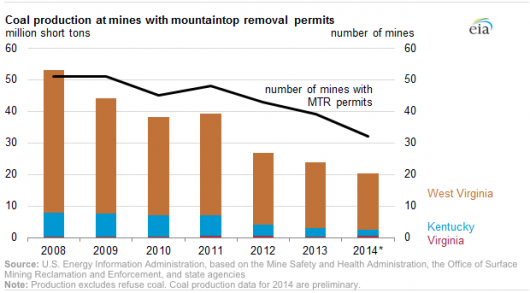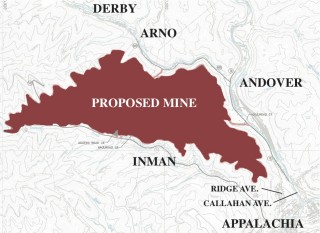Posts Tagged ‘Health’
A moment of truth for Kentucky’s coal regulators
A striking case of corruption related to mine inspections in Kentucky led to the recent criminal conviction of former Democratic state representative Keith Hall. But questions remain about how deep the conspiracy goes. Will Governor Steve Beshear and the state agencies that enforce mining laws in Kentucky adequately investigate?
Read MoreInterior Department Issues Draft Stream Protection Rule
Contact: Cat McCue, Communications Director, 434-293-6373, cat@appvoices.org Today, the U.S. Department of the Interior issued a long-awaited draft of the Stream Protection Rule, which the agency has been working on since 2010. The purpose of the rule is to prevent or minimize the impacts of surface coal mining on surface water and groundwater. The agency’s…
Read MoreHow much progress are we making on ending mountaintop removal?
Last week, the U.S. Energy Information Administration pointed to a steep decline in coal produced by mountaintop removal mining. But
a closer examination of the data calls into question the adequacy of the legal definition of “mountaintop removal” and, more importantly, demonstrates that much more work is needed to truly end destructive mining practices in Central Appalachia.
Eliminating poverty housing with efficient and alternative energy use
When North Carolina’s Ashe County Habitat for Humanity formed five years ago, seven people came together to study how to best build a home. They made a commitment not only to affordability, but also to energy savings, and the board voted to build all Ashe County Habitat houses to maximize efficiency and place an emphasis on alternative forms of energy.
Read MoreIson Rock Ridge and land ownership in Appalachia
Earlier this summer, our friends at Southern Appalachian Mountain Stewards celebrated the defeat of a proposed mountaintop removal mine along Ison Rock Ridge in Southwest Virginia. But although the imminent threat of mining is past, the land on Ison Rock Ridge is still owned by an absentee landholding company in the business of leasing out tracts to coal operators for mountaintop removal.
Read MoreEIA: Mountaintop removal coal production down
The U.S. Energy Information Agency (EIA) published a blog post today showing that coal produced by mountaintop removal mining in Central Appalachia decreased by 62 percent between 2008 and 2014. Demand for Central Appalachian coal will continue to decline, making further progress inevitable. But we won’t end mountaintop removal by relying on the market alone.
Read More“It’s just vitamins!” Industry confuses residents on coal ash safety
Duke Energy and the N.C. Department of Environment and Natural Resources continue to confound and confuse families that have the unfortunate luck of living in close proximity to the utility’s coal ash lagoons. So citizens and county officials are stepping in to help residents air their frustrations and, hopefully, to receive some answers.
Read MoreDuke expands coal ash cleanup, but leaves N.C. communities in danger
 Duke Energy announced it plans to excavate coal ash from ponds at three power plant sites in North Carolina, along with two more at its South Carolina facilities. But the fates of several sites that pose significant threats to drinking water and surrounding communities remain unclear.
Duke Energy announced it plans to excavate coal ash from ponds at three power plant sites in North Carolina, along with two more at its South Carolina facilities. But the fates of several sites that pose significant threats to drinking water and surrounding communities remain unclear.
Video illustrates need for energy efficiency in the High Country
 In the mountainous northwestern corner of North Carolina, many residents struggle to afford to heat their homes, especially during the region’s long, harsh winters. As part of our High Country Energy Savings campaign, we produced a video featuring the three winners of our High Country Home Energy Makeover contest that provides a glimpse of their experiences with high energy bills and the benefits of greater energy efficiency.
In the mountainous northwestern corner of North Carolina, many residents struggle to afford to heat their homes, especially during the region’s long, harsh winters. As part of our High Country Energy Savings campaign, we produced a video featuring the three winners of our High Country Home Energy Makeover contest that provides a glimpse of their experiences with high energy bills and the benefits of greater energy efficiency.
Appalachian Regional Commission receives citizen input
 On June 4, the Appalachian Regional Commission held one of its five 2016-2020 Strategic Plan Listening Sessions in Morehead, Ky. The session successfully facilitated the sharing of ideas by Appalachian stakeholders that will inform the commission’s plan for improving economic opportunities in communities across the region.
On June 4, the Appalachian Regional Commission held one of its five 2016-2020 Strategic Plan Listening Sessions in Morehead, Ky. The session successfully facilitated the sharing of ideas by Appalachian stakeholders that will inform the commission’s plan for improving economic opportunities in communities across the region.





